英语重音Stress
原文stress

•stress [stres] n. 压力;紧张;重要性;强调;重读vt. 强调;加压力于;使紧张;用重音读under the stress of poverty在贫困的压力下time of stress危难之际,非常时期make a list of 列出清单a shopping list一张购物单a guest list客人名单a list of things to do 事项表•Stress is what you feel when you react to pressure, either from the outside world or from inside yourself. Stress is a normal reaction for people of all ages.Most people think that pressure is always a bad thing. In fact, a little bit of stress is good. Without stress, most of us couldn’t push ourselves to do well, especially in difficult things.People usually complain about feeling pressed for time when they areunder certain pressure. It is true that you can’t always control the things that are stressing you out, but you can control how you react to them. The way you feel about things results from the way you think about things. If you change how you think, you can change the way you feel. Try thefollowing tips to deal with your stress:Make a list of the things that are causing your stress.Give yourself an excuse.Don't promise to do things you can't do or don't want to do.Find someone to talk to.。
stress的用法总结大全
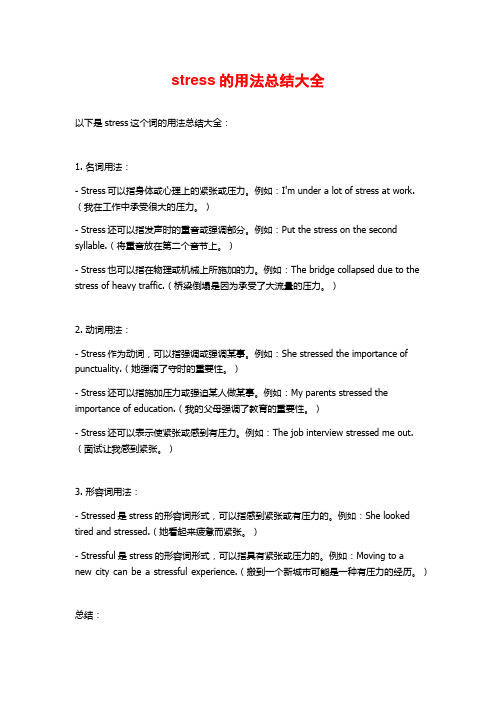
stress的用法总结大全以下是stress这个词的用法总结大全:1. 名词用法:- Stress可以指身体或心理上的紧张或压力。
例如:I'm under a lot of stress at work.(我在工作中承受很大的压力。
)- Stress还可以指发声时的重音或强调部分。
例如:Put the stress on the second syllable.(将重音放在第二个音节上。
)- Stress也可以指在物理或机械上所施加的力。
例如:The bridge collapsed due to the stress of heavy traffic.(桥梁倒塌是因为承受了大流量的压力。
)2. 动词用法:- Stress作为动词,可以指强调或强调某事。
例如:She stressed the importance of punctuality.(她强调了守时的重要性。
)- Stress还可以指施加压力或强迫某人做某事。
例如:My parents stressed the importance of education.(我的父母强调了教育的重要性。
)- Stress还可以表示使紧张或感到有压力。
例如:The job interview stressed me out.(面试让我感到紧张。
)3. 形容词用法:- Stressed是stress的形容词形式,可以指感到紧张或有压力的。
例如:She looked tired and stressed.(她看起来疲惫而紧张。
)- Stressful是stress的形容词形式,可以指具有紧张或压力的。
例如:Moving to a new city can be a stressful experience.(搬到一个新城市可能是一种有压力的经历。
)总结:stress这个词可以用作名词、动词和形容词。
作为名词,stress可以指身体或心理上的紧张或压力,也可以指发声时的重音或机械上的力。
stress的用法总结大全

stress的用法总结大全想知道stress的用法吗?今天给大家带来了stress的用法,希望能够帮助到大家,下面就和大家分享,来欣赏一下吧。
stress的用法总结大全stress的意思n. 强调,重音,压力,重力vt. 重读,[机械学]使承受压力,给…加压力(或应力)变形:过去式: stressed; 现在分词:stressing; 过去分词:stressed;stress用法stress可以用作动词stress用作名词时基本意思是“重音”,转化为动词意思是“重读”。
引申可表示“强调”。
stress只用作及物动词,可接名词、代词、that从句作宾语。
stress作动词时,和lay stress on一样,一般表示“强调”,有时表示“注重”。
In his speech he stresses(或lays stress on)honestyas an important virtue.他在演讲中强调诚实是一种很重要的美德。
stress用作动词的用法例句Here I will stress the importance of mathematics to the whole of science.这里我要强调数学对整个科学的重要性。
In English, speakers can stress or emphasize words they think are important.在英语中,说话者可以重读或强调他们认为重要的单词。
stress用法例句1、Massage is used to relax muscles, relieve stress and improve the circulation.按摩可以使肌肉放松,缓解压力和促进血液循环。
2、Stress is widely perceived as contributing to coronary heart disease.压力被广泛认为是导致冠心病的一个因素。
WordStressandSentenceStress重音是英语发音的关键环节
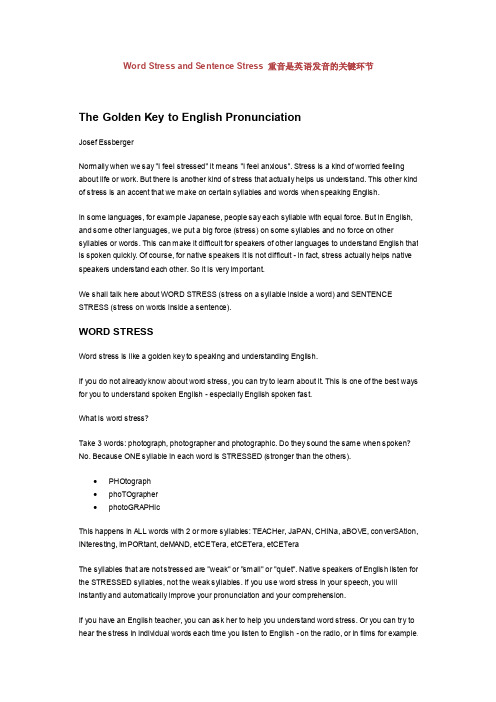
Word Stress and Sentence Stress 重音是英语发音的关键环节The Golden Key to English PronunciationJosef EssbergerNormally when we say "I feel stressed" it means "I feel anxious". Stress is a kind of worried feeling about life or work. But there is another kind of stress that actually helps us understand. This other kind of stress is an accent that we make on certain syllables and words when speaking English.In some languages, for example Japanese, people say each syllable with equal force. But in English, and some other languages, we put a big force (stress) on some syllables and no force on other syllables or words. This can make it difficult for speakers of other languages to understand English that is spoken quickly. Of course, for native speakers it is not difficult - in fact, stress actually helps native speakers understand each other. So it is very important.We shall talk here about WORD STRESS (stress on a syllable inside a word) and SENTENCE STRESS (stress on words inside a sentence).WORD STRESSWord stress is like a golden key to speaking and understanding English.If you do not already know about word stress, you can try to learn about it. This is one of the best ways for you to understand spoken English - especially English spoken fast.What is word stress?Take 3 words: photograph, photographer and photographic. Do they sound the same when spoken? No. Because ONE syllable in each word is STRESSED (stronger than the others).∙PHOtograph∙phoTOgrapher∙photoGRAPHicThis happens in ALL words with 2 or more syllables: TEACHer, JaPAN, CHINa, aBOVE, converSAtion, INteresting, imPORtant, deMAND, etCETera, etCETera, etCETeraThe syllables that are not stressed are "weak" or "small" or "quiet". Native speakers of English listen for the STRESSED syllables, not the weak syllables. If you use word stress in your speech, you will instantly and automatically improve your pronunciation and your comprehension.If you have an English teacher, you can ask her to help you understand word stress. Or you can try to hear the stress in individual words each time you listen to English - on the radio, or in films for example.Your first step is to HEAR and recognise it. After that, you can USE it.Two important rules about word stress:1. One word, one stress2. The stress is always on a vowelSENTENCE STRESSSentence stress is another golden key for speaking and understanding English. With sentence stress, some words in a sentence are STRESSED (loud) and other words are weak (quiet). Look at the following sentence:We want to go.Do we say every word with the same stress or force? No. We make the important words BIG and the unimportant words small. What are the important words in this sentence? Yes, that's right: WANT and GO.∙We WANT to GO.∙We WANT to GO to WORK.∙We DON'T WANT to GO to WORK.∙We DON'T WANT to GO to WORK at NIGHT.Now that you know that word stress exists, you can try to learn more about it.You should KNOW that SENtence and WORD STRESS are VERy imPORtant1998 Josef Essberger。
词重音

Jasmin语音交流课堂第43期:词重音重音是韵律的基础,他可以被分为词重音和句重音。
针对多少个音节一个词可以容纳的音节的多少,我们可以把英语单词分为三类:monosyllables单音节词,disyllables双音节词,polysyllables 多音节词。
在每个英语单词的两个或更多的音节中至少有一个音节应该比其他的发以更强、更大的声音,所以我们就称这些为词重音现象。
首先我们来看看重音的分类。
我们可以把他分为三类:如be ' gin,2.重音secondary就是用( ֽ)标记在左下方角落,上都标记到,在一个单词中有两个重音,如/ ֽ fif 'ti:n/。
每个英语单词都有固定的重音分布,我们不能改变的,如果随便改变,那么我们就很难分清单词了。
尽管重音的分布在英语单词学习中非常复杂,我们依然有很多规则去认识他们。
我们先来看看简单单词的重音的分布规则。
1.于大多数只有两个音节的英语单词而言,重音通常落在第一个音节上。
如'common, 'nation, 'open, 'study, 'sorry, 'any2.于有三个或以上的音节的单词而言,重音通常落在从末尾数第三'economy, 'technologycarry major service luggageJasmin语音交流课堂第44期:复杂单词中的重音分布1、对于只有两三个音节并且有一个前缀的单词而言,重音通常落在前缀后的一个音节上。
con- con'sist de- de'tect dis- dis'cuss2、对于有一个后缀的单词而言,重音通常落在后缀前的一个音节上。
-eous er'roneous -ial prefe'rential-ience ex'perience -ient suf'ficient-ify in'tensify -ion tran'sition-ious am'bitious -ity ֽcuri'osity3、有后缀的单词不改变他们的重音的分布。
英语的重音、语调、声调及其
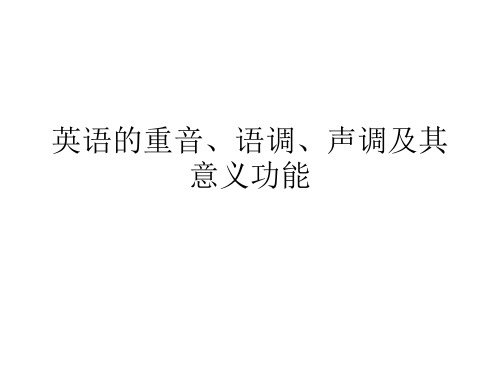
声调(tone)
• 虽然英语是重音节奏语言,人们也可以在 单音节词汇上使用不同的声调,即音高变 化。
• nō nó nǒ nò no 的词义不会直接发生改变,当然,不同 的调型自身会有不同的话语含义,但只是 间接意义,隐含意义。——《英语重音动 态研究》徐曦明 上海交通大学出版社 P204
语调(Intonation)
,grey ‘head 白胡子 ‘grey ,head 老人
• b 名+名
,cross ‘word 气话 ‘cross ,word 字谜游戏
,family ‘size 家庭规模 ‘family ,size 家用规格
,horse ‘shit 马粪 ‘horse ,shit 胡说
• C ing
• ,dancing ‘girl 正在跳舞的女孩 • ‘dancing ,girl 舞女
• c 意义不同
动 di‘gest 消化 ob‘ject 反对 con‘cert 协商
名 ’digest 摘要 ’object 物体 ’concert音乐会
• 二、 词组 • a形+名
• ,green ‘house 绿房子 ‘green ,house 温室
,black ‘bird 黑色的鸟 ‘black ,bird 画眉
重音的意义功能
• 一、单词
• a.重音换位,词性改变,意义相同
•动
名
con‘flict
‘conflict
斗争
in‘sult
’insult
侮辱
fre‘quent
’frequent
频繁
• b 意义微妙变化
•动
名
• per‘v‘sert 遗弃 ’desert 沙漠,被遗弃的地 方
英语句子的重音详解

• Must I stick it on myself? • Must I ‘stick it ‘on my’self? • Must I ‘stick it on my’self?
1
• ‘What ‘s the ‘matter? • The ‘sweater is ‘beautiful. • Your ‘book is on the ‘desk. • He ‘started ‘counting it. • He ‘usually ‘gets up at ‘six o’clock.
'sister.
8
形容词(包括分词作形容词)一般都应重读 数词一般都应重读
The 'streets are 'wide, 'clean and 'beautiful. 'This 'narrow 'valley was the 'scene of a
'famous 'battle. His 'first daughter is fif'teen. It’s a 'dull and disap'pointing film. 'That’s ex'citing news. The 'worried man 'entered the 'crowded 'street. He 'bought 'ten 'cups and 'I bought only 'four.
'Who 'came to 'see you this 'morning?
英语语言学——重音Stress

The location of stress in English distinguishes meaning. For example, a shift of stress may change the part of speech of a word from a noun to a verb although its spelling remains unchanged. 如:contract , abstract , permit 这三个词的重音都放在第 一个音节时,它们都是名词,含义为合同,摘要,许 可证。如果将他们的重音移动到第二个音节上时,则 变成动词,含义分别是定合同,提取,允许。
refers to relative emphasis or prominence (突出) given to a syllable (音节) in a word, or to a word in a phrase or sentence
1、word stress
2、sentence stress
3.复合形容词的重音一般在第二个音节上。
如:green-eyed /gri:n'aid/ 嫉妒的 ;
Байду номын сангаас
4.反身代词的重音通常在第一个音节上。如:
myself /mai'self/ 我自己 ;
The combinations of –ing forms and nouns 复合词的重音总是在第一个构成成分上,而次重音在第
Noun Main verb Adjective Adverbs Numerals(数词) Demonstrative pronouns(指示代词)
An elephant is an animal.
语音学单词重音讲解课件word stress

word stress (单词重音)
word stress (单词重音)
The stress patterns of two-element compounds and noun phrases *Compounds may be pronounced on two stress patterns: Primary stress on the first component: "saucepan, "grand%father Primary stress on the second component: %first- "class, %second- "hand *compound proper nouns normally have a primary stress on the second element, except for the names of streets New "York, United "Nations, Atlantic "Ocean, "Forest Street *In noun phrases (adj. + n.), nouns should receive primary stress:
word stress (单词重音)
Distinctive word stress patterns / stress influence on word meaning Some two-syllable words distinguish their noun/adjective forms from their verb forms by a difference in stress patterns: the noun/adjective form has primary stress on the first syllable and the verb form has primary stress on the second syllable. "import (n.), im"port (v.) "present (n./a.), pre"sent (v.)
语音课讲义词重音与句重音

语音课讲义词重音与句重音词重音(Word stress)单词重音是指人们在单独朗读一个单词时的一套重音规则。
单词重音是单词语音结构的一部分,一个词如果重音读错了,整个词也就读错了。
每个单词的重音在字典里都能查到。
下面简要介绍一些常见规律。
1.有些拼法相同的双音节词,重音可在第一音节或第二音节上,重音在前是名词,重音在后是动词,且有些词中的元音也有变化。
作为名词的重音在前作为动词的重音在后conduct ['k?nd?kt] 行为con?duct[k?n'd?kt] 执行export [?eksp??t] 出口ex?port[?k?sp??t] 输出import ['?mp??t]进口im?port[?m'p??t] 引入increase ['?nkris]增加in?crease[?n'kri?s] 加大object ['?bd??kt]物体ob?ject[?b?d?ekt] 反对record [?rek??d]记录re?cord[r??k?rd] 记录present [?preznt] 礼物pre?sent[pr??zent] 赠送2.三音节词的重音一般在第一个音节上。
例如:?origin; ?fortunate; ?industry; ?property; ?carpenter; ?advoc ate; ?hospital; ?critical 但有些三音节词的重音也落在第二音节,即倒数第二个音节上。
例如:mos?quito; com?posure; re?member; de?fensive; tre?mendous3. 以-ic/-sion/-tion/-ian为结尾的单词重音也大多落在倒数第二个音节上。
例如:demo?cratic; geo?graphic;appreci?ation; desti?nation; civili?zation; ex?cursion; ex?bition; mu?sician4.包含四个音节及以上的多音节词的重音一般在倒数第三个音节(以-al/-cy/-fy/-gy/-ty/phy为结尾的单词,重音通常会在倒数第三个音节上。
word stress(语音教学)
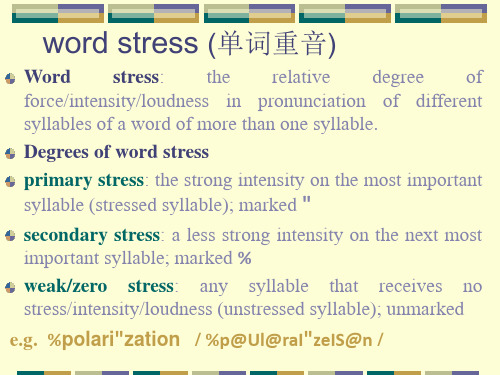
Distinctive word stress patterns / stress influence on word meaning Some two-syllable words distinguish their noun/adjective forms from their verb forms by a difference in stress patterns: the noun/adjective form has primary stress on the first syllable and the verb form has primary stress on the second syllable. "import (n.), im"port (v.) "present (n./a.), pre"sent (v.)
word stress (单词重音)
word stress (单词重音)
The stress patterns of two-element compounds and noun phrases *Compounds may be pronounced on two stress patterns: Primary stress on the first component: "saucepan, "grand%father Primary stress on the second component: %first- "class, %second- "hand *compound proper nouns normally have a primary stress on the second element, except for the names of streets New "York, United "Nations, Atlantic "Ocean, "Forest Street *In noun phrases (adj. + n.), nouns should receive primary stress:
人教版高二英语选修六同步复习全攻略3.1 重点词汇短语细解(含解析)
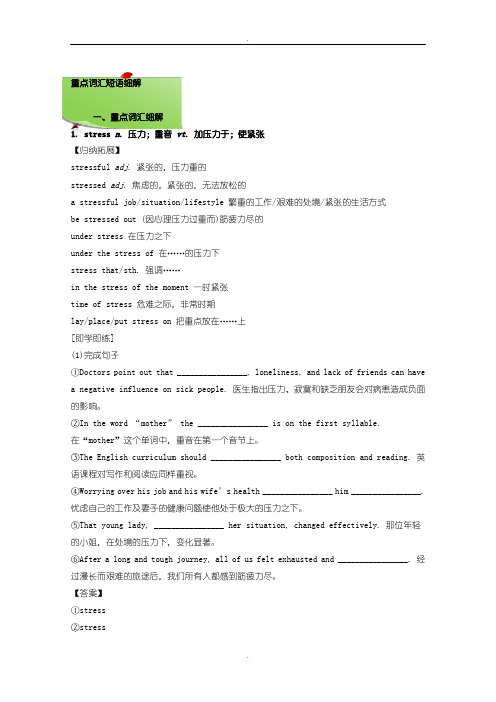
重点词汇短语细解一、重点词汇细解1. stress n.压力;重音vt.加压力于;使紧张【归纳拓展】stressful adj.紧张的,压力重的stressed adj.焦虑的,紧张的,无法放松的a stressful job/situation/lifestyle 繁重的工作/艰难的处境/紧张的生活方式be stressed out (因心理压力过重而)筋疲力尽的under stress 在压力之下under the stress of 在……的压力下stress that/sth. 强调……in the stress of the moment 一时紧张time of stress 危难之际,非常时期lay/place/put stress on 把重点放在……上[即学即练](1)完成句子①Doctors point out that ________________, loneliness, and lack of friends can havea negative influence on sick people. 医生指出压力、寂寞和缺乏朋友会对病患造成负面的影响。
②In the word “mother” the ________________ is on the first syllable.在“mother”这个单词中,重音在第一个音节上。
③The English curriculum should ________________ both composition and reading. 英语课程对写作和阅读应同样重视。
④Worrying over his job and his wife’s health ________________ him ________________. 忧虑自己的工作及妻子的健康问题使他处于极大的压力之下。
⑤That young lady, ________________ her situation, changed effectively. 那位年轻的小姐,在处境的压力下,变化显著。
10 Stress in simple words单词中的重音汇总
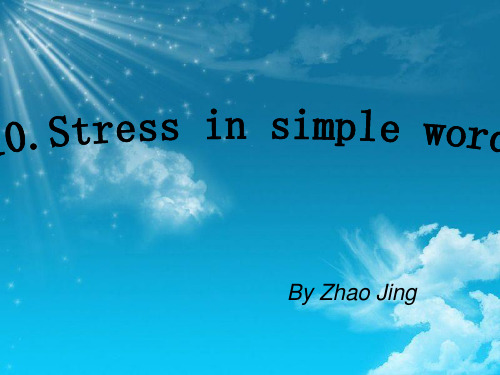
Production & Perception
The production of stress is to depend on the speaker using more muscular energy than is used for unstressed syllables. According to experimental studies, the muscles that we use to expel air from the lungs are more active producing higher subglottal pressure in producing stressed syllables.
• 10.1 The nature of stress
• 1. What is stress? • 2). In linguistics • stress is the relative emphasis that may be given to certain syllables in a word, or to certain words in a phrase or sentence. The term is also used for similar patterns of phonetic prominence inside syllables. The word "accent" is often used with this sense, but it may be used for other kinds of prominence; stress specifically may thus be called stress accent or dynamic accent.
英语中句子重音的概念

英语中句子重音的概念句子重音是指在英语中,对句子中的某些单词或短语施加特定的语音强调,以突出重要信息或控制句子节奏的语法现象。
重音可以改变句子的意思或语调,使听者更容易理解句子的含义。
句子重音有以下几个概念:1. 主重音(Primary Stress):在一个多音节的单词或短语中,主重音是最强的重音,通常出现在单词的第一个音节上或短语的重要单词上。
主重音的位置可以改变单词或短语的意思。
例如:- "QUALity"(质量)中的主重音在第一个音节"QUAL"。
- "enJOY a MEAL"(享受一顿饭)中的主重音在动词"enJOY"。
- "I WAS eating"(我在吃饭)中的主重音在动词"WAS",表示强调动作正在进行。
2. 次重音(Secondary Stress):在一个多音节的单词或短语中,次重音是比较强的重音,出现在次重要的音节上。
次重音通常出现在离主重音较远的位置上。
例如:- "imPORtant"(重要的)中的次重音在第二个音节"POR"。
- "reCENTly"(最近)中的次重音在第一个音节"CEN"。
3. 无重音(Unstressed):在一个多音节的单词或短语中,没有重音的音节被认为是无重音的。
无重音的音节通常发音比较轻弱,缺乏语音上的强调。
例如:- "inFORMation"(信息)中的无重音在第一和第三个音节。
- "commuNIcate"(沟通)中的无重音在第一、第三和第四个音节。
重音在英语中是非常重要的,它可以帮助听者理解不同词类的变化,区分不同的词义,以及控制句子的节奏和语调。
stress的用法总结大全
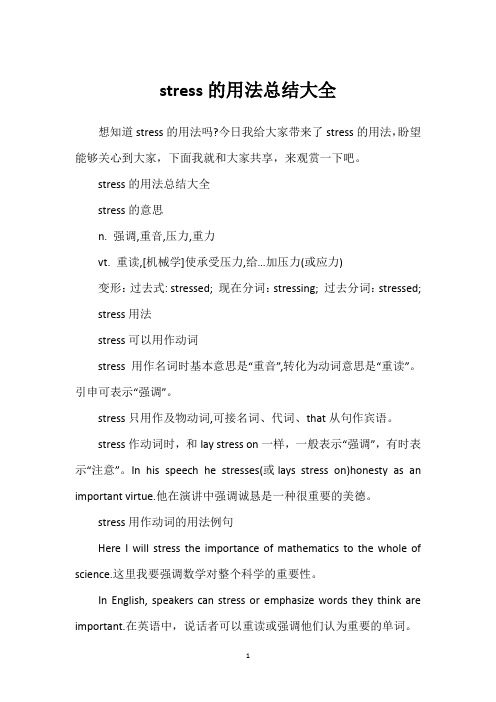
stress的用法总结大全想知道stress的用法吗?今日我给大家带来了stress的用法,盼望能够关心到大家,下面我就和大家共享,来观赏一下吧。
stress的用法总结大全stress的意思n. 强调,重音,压力,重力vt. 重读,[机械学]使承受压力,给…加压力(或应力)变形:过去式: stressed; 现在分词:stressing; 过去分词:stressed;stress用法stress可以用作动词stress用作名词时基本意思是“重音”,转化为动词意思是“重读”。
引申可表示“强调”。
stress只用作及物动词,可接名词、代词、that从句作宾语。
stress作动词时,和lay stress on一样,一般表示“强调”,有时表示“注意”。
In his speech he stresses(或lays stress on)honesty as an important virtue.他在演讲中强调诚恳是一种很重要的美德。
stress用作动词的用法例句Here I will stress the importance of mathematics to the whole of science.这里我要强调数学对整个科学的重要性。
In English, speakers can stress or emphasize words they think are important.在英语中,说话者可以重读或强调他们认为重要的单词。
stress用法例句1、Massage is used to relax muscles, relieve stress and improve the circulation.按摩可以使肌肉放松,缓解压力和促进血液循环。
2、Stress is widely perceived as contributing to coronary heart disease.压力被广泛认为是导致冠心病的一个因素。
句子重音
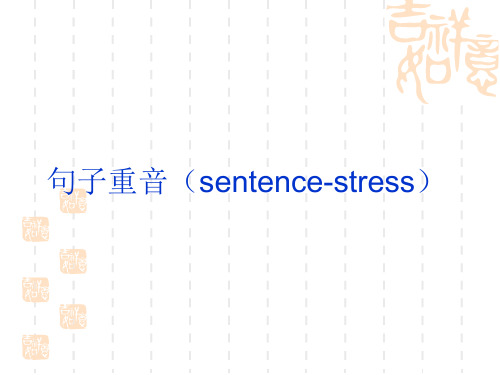
语调
▪ 英语语调主要有降调、升调和平调三大类。 ▪ 不同的语调可以表示说话人不同的态度和
不同的隐含意思。 ▪ 英语中同一句话采用不同的语调会产生截
然不同的语意概念。如“Yes” ▪ 语调具有强烈的感情色彩,它使语言更富
有表现力。
▪ 降调 ▪ 用于陈述句 ▪ I have already read that book. ↘ ▪ That street is two miles long. ↘ ▪ 用于特殊疑问句 ▪ What has happened to him? ↘ ▪ Which direction is it to the post office? ↘ ▪ 注意:特殊疑问句有时可用升调表示请别人重复
and English. ↘ ▪ Such as water , tea ,coffee ,and juice ▪ 用于陈述句,表示疑问、怀疑、未定、猜测或
期待等
▪ Your really want to do it? ↗ ▪ She might have gone. ↗ ▪ I think so. ↗
2.凡是有强读和弱读的词,一般词典中都有音标,有些词的弱式 有两种或多种发音,列在最后面的最弱。 下面所列举的仅是其中最常用的一部分。
1)特殊动词(系动词、助动词和情态动词)
2) 代词
3) 冠词、介词、连词 4ቤተ መጻሕፍቲ ባይዱ 其他
省略元音的弱式,例如: have/v/; had/d/; should ; will/l/; and/n/通常用于元音结尾的词之后。
▪ ‘What ‘s the ‘matter? ▪ The ‘sweater is ‘beautiful. ▪ Your ‘book is on the ‘desk. ▪ He ‘started ‘counting it. ▪ He ‘usually ‘gets up at ‘six o’clock.
stress语言学定义
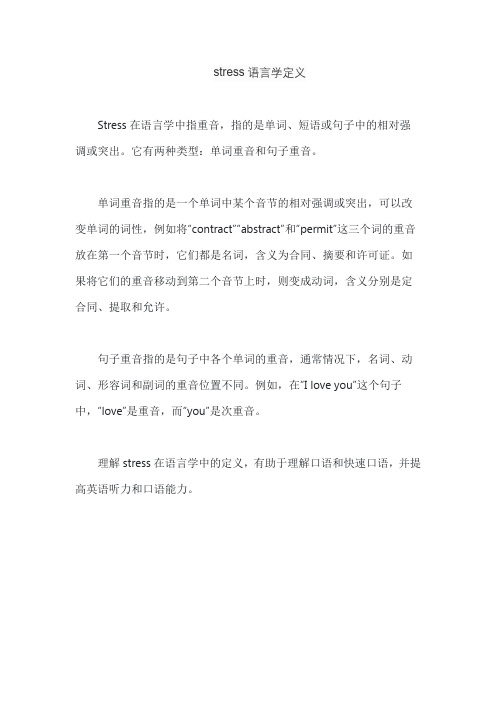
stress语言学定义
Stress在语言学中指重音,指的是单词、短语或句子中的相对强调或突出。
它有两种类型:单词重音和句子重音。
单词重音指的是一个单词中某个音节的相对强调或突出,可以改变单词的词性,例如将“contract”“abstract”和“permit”这三个词的重音放在第一个音节时,它们都是名词,含义为合同、摘要和许可证。
如果将它们的重音移动到第二个音节上时,则变成动词,含义分别是定合同、提取和允许。
句子重音指的是句子中各个单词的重音,通常情况下,名词、动词、形容词和副词的重音位置不同。
例如,在“I love you”这个句子中,“love”是重音,而“you”是次重音。
理解stress在语言学中的定义,有助于理解口语和快速口语,并提高英语听力和口语能力。
句子重读轻读
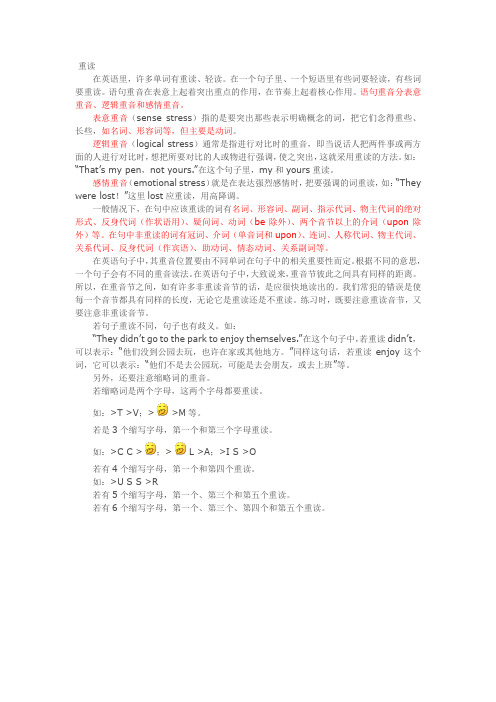
重读在英语里,许多单词有重读、轻读。
在一个句子里、一个短语里有些词要轻读,有些词要重读。
语句重音在表意上起着突出重点的作用,在节奏上起着核心作用。
语句重音分表意重音、逻辑重音和感情重音。
表意重音(sense stress)指的是要突出那些表示明确概念的词,把它们念得重些、长些,如名词、形容词等,但主要是动词。
逻辑重音(logical stress)通常是指进行对比时的重音,即当说话人把两件事或两方面的人进行对比时,想把所要对比的人或物进行强调,使之突出,这就采用重读的方法。
如:“That’s my pen,not yours.”在这个句子里,my和yours重读。
感情重音(emotional stress)就是在表达强烈感情时,把要强调的词重读,如:“They were lost!”这里lost应重读,用高降调。
一般情况下,在句中应该重读的词有名词、形容词、副词、指示代词、物主代词的绝对形式、反身代词(作状语用)、疑问词、动词(be除外)、两个音节以上的介词(upon除外)等。
在句中非重读的词有冠词、介词(单音词和upon)、连词、人称代词、物主代词、关系代词、反身代词(作宾语)、助动词、情态动词、关系副词等。
在英语句子中,其重音位置要由不同单词在句子中的相关重要性而定。
根据不同的意思,一个句子会有不同的重音读法。
在英语句子中,大致说来,重音节彼此之间具有同样的距离。
所以,在重音节之间,如有许多非重读音节的话,是应很快地读出的。
我们常犯的错误是使每一个音节都具有同样的长度,无论它是重读还是不重读。
练习时,既要注意重读音节,又要注意非重读音节。
若句子重读不同,句子也有歧义。
如:“They didn’t go to the park to enjoy themselves.”在这个句子中,若重读didn’t,可以表示:“他们没到公园去玩,也许在家或其他地方。
”同样这句话,若重读enjoy这个词,它可以表示:“他们不是去公园玩,可能是去会朋友,或去上班”等。
